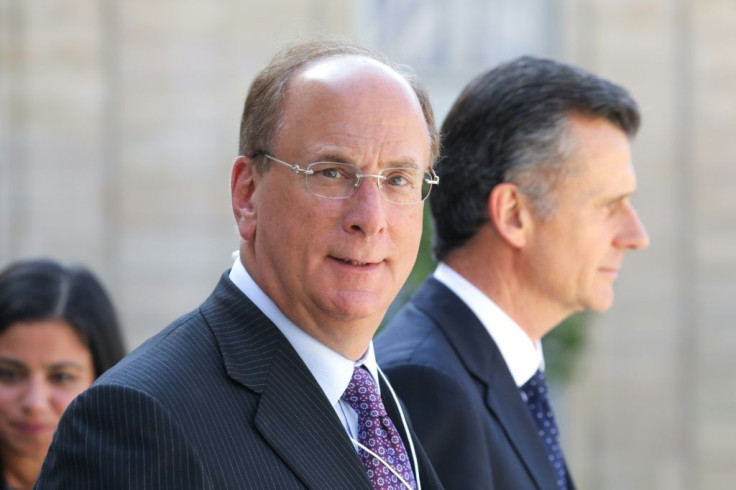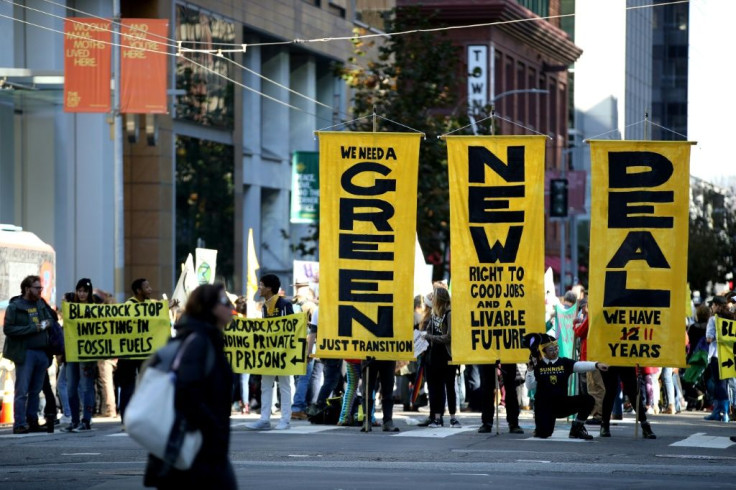Critics See Gap In BlackRock's Climate Rhetoric And Record
BlackRock, the world's biggest money manager, made headlines early this year when it pledged to prioritize climate change in its investments and pare down its coal holdings.
But environmentalists say the company has failed to make good on this promise in a series of shareholder proposals at annual meetings this year.
Led by influential Wall Street player Larry Fink and overseeing some $7.3 trillion in assets, BlackRock in January vowed to take action to address climate change and sustainable development, raising the hopes of environmentalists.
"We applauded BlackRock for its statement at the beginning of this year.... and we acknowledge that they have taken some steps in that direction," said Ben Cushing, who leads the Sierra Club's financial advocacy campaign.
"But clearly it has not translated into fast-enough, or bold-enough action."

Part of the skepticism comes from BlackRock's response to shareholder proposals to require companies to take action on the environment.
BlackRock supported only 13 percent of the green-oriented resolutions in 2020, down from 20 percent in 2019, according to Proxy Insight, which tracks global shareholder voting.
A September report from non-governmental organization Majority Action said the New York financial giant backed only three of 36 resolutions on climate change in proxy votes of S&P 500 companies.
And though BlackRock signed on to Climate Action 100+, a global investor engagement initiative, the company supported just two of 12 resolutions presented by the coalition.
BlackRock holds shares in numerous large companies, including Apple, Facebook and Exxon Mobil, as well as ConocoPhillips and Nike.
Cushing said BlackRock could make a big difference if its actions match its rhetoric.

"BlackRock is a huge contributor to the climate crisis through its financing of fossil fuels, deforestation and other climate damaging industries," he said.
"They are one of the world's largest shareholders in almost every publicly traded company," Cushing said. "That gives BlackRock tremendous power and leverage to steer the behavior of corporations in the US and around the world."
The company voted against proposals to require Chevron to develop a report on the risks from petrochemical plants and to make Delta Airlines evaluate how its lobbying strategy conforms with the Paris Climate Accord, saying the firms already had taken steps to address the issue.
But BlackRock has defended its record, saying it had taken other steps, like voting against board nominees who are not committed to environmental issues and prodding action in meetings with company management.
"It's worth noting that not all shareholder proposals are created equal," the company said. "Blindly supporting proposals is not a responsible approach to stewardship."
But Giulia Christianson, head of sustainable investment at the World Resources Institute, said other big investors are stepping up on the environment.
According to the report from Majority Action, investment heavyweight Pimco voted in favor of all the resolutions considered essential for the environment.
The same report credited French company Amundi with a 78 percent record and JPMorgan Chase with a 53 percent record. BlackRock backed only eight percent of the resolutions.
"The voting record that we've seen from BlackRock this year is discouraging," Christianson said, noting an apparent "disconnect" between BlackRock's actions and earlier statements that implied it viewed promoting sustainability as part of its fiduciary duty.
And Christianson notes that it makes good business sense: environmental, social and corporate governance (ESG) investments have gained more legitimacy in recent years and many green-oriented companies have outperformed amid the tumult of the coronavirus.
"We're seeing ESG funds make it through the current stress test of market volatility pretty well and in many cases better than their traditional index counterparts," she said.
© Copyright AFP {{Year}}. All rights reserved.





















